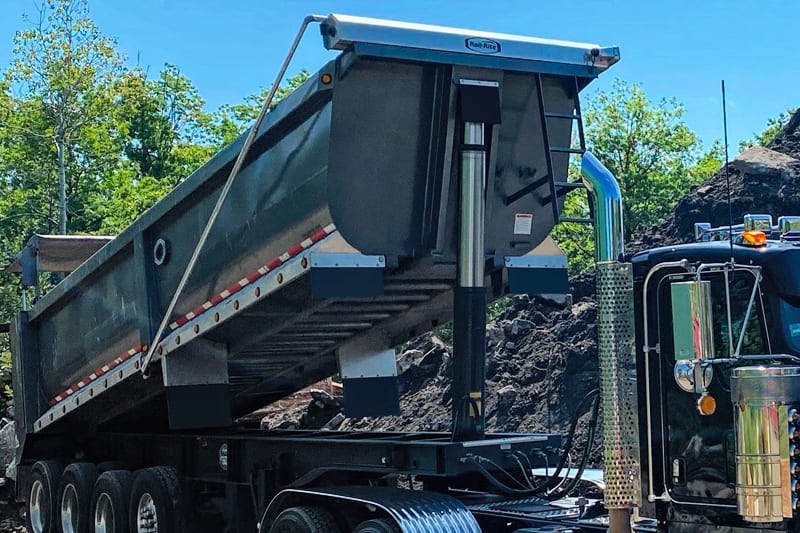
Imagine hauling a load of gravel or sand during inclement weather and you discover that your tarp system isn’t working properly. The last thing you want to do is troubleshoot a motor issue or a major tarp tear during bad weather. An improperly secured tarp is bad for business. A damaged load or dangerous road conditions can lead to lost profit or hefty fines that impact your bottom line.
Choosing the right tarp and tarp system for your dump truck or trailer isn’t just about meeting regulations—it’s about saving time, and money and preventing accidents. This guide will help you navigate the options, so you can make an informed decision about which tarp system is best suited to your needs.
Tarp Systems: What Are You Hauling?
The materials you’re transporting play a huge role in determining the type of tarp you need. Consider construction materials such as sand or aggregates. Large volumes of loose materials like this are typically transported in dump trucks. These trucks need a reliable tarping system designed for low maintenance. When hauling these particular materials, drivers often opt for a mesh tarp which offers breathability and protection.
Moisture-sensitive materials such as grain or compost require waterproof tarps. These heavy-duty, waterproof vinyl tarps are often used on agricultural dump trucks and dump trailers to provide complete protection from the elements. Most heavy haulers look for features such as reinforced webbing and rust-proof grommets for easy attachment.
Asphalt or temperature-sensitive loads require a specific type of heavy-duty vinyl designed to maintain a specific temperature. These tarps offer insulation and protection, ensuring the material stays at the correct temperature throughout the journey.
Ultimately, what you are hauling is one of the primary factors in selecting a containment solution. Make a list of your requirements. Identify what is working with your current solution and what needs improvement.
External Factors: What Weather Will You Experience?
Not all tarp systems are built to handle every weather condition. The environment can have a huge impact on your tarping needs. In hot and dry climates with extreme sun, you might consider a tarp that provides UV resistance. Windy climates might require a tarp with reinforced edges and a taut fit, like an arm-style or side lock-down system. In wet climates, a waterproof vinyl tarp is non-negotiable. It will keep your load dry and prevent materials like dirt or gravel from becoming soggy and harder to unload.
How Much Automation Do You Need?
Working as a heavy hauler requires drivers to perform under demanding conditions that never stop. While there are many aspects of hauling that are outside of a driver’s control, tasks like load securement can easily be improved to ensure a payload remains secure and the work environment remains safe. Below is a quick breakdown of manual vs. automated tarp systems.
• Manual Systems: May be preferred for smaller operations and infrequent tarping where budget is a primary concern.
• Automated Systems: Ideal for those looking to save time and increase safety and efficiency with electric systems.
No matter which industry you are serving, a quality electric tarp system can benefit any hauler looking to optimize operations. Utilizing an electric tarp for your dump truck or trailer can increase safety and significantly reduce the risk of driver error.
What’s Your Tarp System Preference?
Once you’ve determined what materials you’re hauling and the weather conditions you’re likely to face, it’s time to consider the mechanics of the tarp system itself.
Flip tarps or arm-style tarp systems are ideal for heavy-duty and day-to-day use. They function like a mousetrap in slow motion. Tarp housing units come with different mounting options depending on your setup.
One of the industry’s most widely used arm-style systems is Roll-Rite’s TarpMaster® Series, available for both dump trucks and trailers. These systems are designed to fit most industry-standard dump trucks from single-axle to multi-axle end dumps, and industry-standard trailers such as end dumps, belly dumps, and pup trailers. The systems are pre-packaged with pre-assembled components for easy installation.
Cable tarp systems are great for low-clearance environments. These systems use a series of cables to slide the tarp over the load, providing full coverage. They are highly efficient at securing loads and protecting the material being hauled. Cable tarp systems are ideal for end dumps, belly dumps, and live bottom trailers. Roll-Rite has been the industry leader in cable tarp systems for many years. Check out our Power Cable Series for both trucks and trailers.
Side roll tarp systems are perfect for large-scale trailer operations, ensuring complete coverage to keep loads dry or maintain a specific temperature range. Side-to-side tarp systems are often found on dump trailers, chip trailers, grain trailers, belly dumps, and transfer trailers. These systems must be durable yet lightweight, and in some scenarios, they are used with a solid vinyl for sealed coverage.
If your hauling needs require this type of system, look for a motor built to withstand the harsh demands of the industry. Roll·Rite’s STS Series features the TarpStretcher® EX which is designed exclusively for side roll tarping and features patented brake technology.
What Makes a Great Tarp System?
Not every manufacturer uses quality parts and materials. As you search for a tarp system, keep in mind that these aspects help ensure a reliable system:
A Quality Electric Motor: This is one of the most important components of an electric tarping system. Look for a reliable motor designed for the high torque demands of tarping. Heat-treated gears will offer a longer life and warranty to protect your investment in the case of premature wear out.
Material Quality and Durability: High-quality materials will ensure the tarp system lasts longer and provides better protection. Look for systems that offer durable construction and a professional appearance. For example, flip tarp arms manufactured from specially treated, high-strength extruded aluminum alloy provide a lightweight system with a maximum strength-to-weight ratio.
A Variety of Mounting Options: Every set-up is slightly different, and haulers need options that can best meet their needs. Look for a system that offers different mounting options with easy installation.
Auto shut-off technology: Features that help prevent downtime are imperative. Look for a system that has built-in protection with auto shut-off to prevent tripping of the breaker. This will eliminate the hassle of resetting tripped breakers.
Remember, there is no such thing as a one-size-fits-all tarp system. Every system offers different benefits and performance features, and you’ll need to consider these details as they relate to your specific truck body and operations.
Selecting a Tarp System for Your Dump Trailer
Choosing the right dump truck or dump trailer tarp system is essential for improving the efficiency, safety, and protection of your loads. By understanding the different types of systems, considering your specific needs, and selecting high-quality products, you can ensure your hauling operations run smoothly and effectively.
Consultations for tarp and safety solutions are available through Roll·Rite's Safe Fleet Service Centers. You may contact our experts directly for quotes, product information, or for help finding your authorized distributor. Need a replacement tarp in a hurry? Shop our Rapid Tarps e-store to find selected tarps in common stock sizes that ship for free!
ABOUT THE AUTHOR
Gary Viall
Senior National Sales Manager, Trailers
Gary Viall has over 26 years of sales experience and is an expert in covering solutions for trailers.

 English
English  Français
Français  Deutsch
Deutsch  Nederlands
Nederlands  Français
Français  English
English  English
English 

